Every year, thousands of people accidentally take two doses of the same medicine-sometimes within hours-because they forgot if they already took it. It’s not just a mistake. It can lead to dizziness, nausea, liver damage, internal bleeding, or even death. And it’s happening more often than you think. In homes across Australia and the U.S., double-dosing is one of the most common causes of medication-related emergencies, especially among older adults and young children.
Why Double-Dosing Happens at Home
It’s not because people are careless. It’s because the system is confusing. Imagine this: Your parent takes seven different pills every day. Some are in bottles, some in blister packs, others are liquids. They’re on a new schedule after surgery. One caregiver gives the morning dose. Another gives the afternoon one. No one writes it down. By 3 p.m., someone sees the pill bottle still on the counter and thinks, “Oh, she didn’t take it yet.”
That’s how it starts. And it’s not rare. According to a 2023 report from the National Council on Patient Information and Education, about half of all medication errors happen at home. For seniors, the average person takes 4 to 5 prescription drugs daily. Add in over-the-counter painkillers, vitamins, and supplements-and you’ve got a recipe for disaster. Many of these products contain the same active ingredient. Tylenol? Acetaminophen. Cold medicine? Also acetaminophen. Take both, and you’ve doubled your dose without even realizing it.
The Most Effective Ways to Stop It
You don’t need fancy tech to stay safe. But you do need a system. And the best systems combine simple tools with clear habits.
Use a Pill Organizer
WesleyLife’s 2023 survey found that 68% of seniors use a weekly pill organizer. Why? Because it works. A simple plastic box with compartments for each day-and separate slots for morning, afternoon, and night-lets you see at a glance what’s been taken. No guessing. No counting. No panic.
Set it up once a week. Put the pills in before breakfast. When you take your dose, you see the empty slot. No need to remember. No need to ask. If the pill’s still there, you haven’t taken it. If it’s gone, you have. That’s it.
For people taking multiple daily doses, this is the single most effective tool. Studies show it reduces double-dosing by 35%. And when paired with a reminder? That jumps to 62%.
Set Digital Reminders
Smartphones are already in your pocket. Use them. Apps like Medisafe, MyTherapy, or even the built-in alarm function can send a beep, a vibration, or a pop-up when it’s time to take your medicine.
But here’s the trick: Don’t just set the alarm. Set the confirmation. After you take the pill, tap “Taken” in the app. If you miss it, the app will remind you again-and flag it as a potential error. Medisafe’s 2022 study showed an 87% improvement in adherence when users used this feature.
Even better? Share the access. If you’re helping a parent or child, give a family member access to the app. They’ll get a notification if the dose wasn’t taken. No phone calls. No guessing. Just peace of mind.
Keep a Medication List
Write down every single thing you or your loved one takes. Not just prescriptions. Include:
- Over-the-counter pain relievers
- Vitamins and supplements
- Herbal remedies
- Topical creams with active ingredients
Update it every time something changes. Keep a copy in your wallet, on the fridge, and with your doctor. This isn’t just for double-dosing. It’s for avoiding dangerous interactions. For example, warfarin (a blood thinner) can react badly with certain herbal supplements. If your pharmacist doesn’t know you’re taking them, they can’t warn you.
EssexCare Pharmacy found that 32% of double-dosing cases in 2023 happened because patients didn’t realize two different medicines had the same active ingredient. That’s preventable.
Measure Liquids Correctly
Kitchen spoons are not medicine spoons. They vary wildly in size-from 2.5 mL to 7.3 mL. That’s a 200% difference. If you’re giving a child liquid medicine and you use a regular teaspoon, you might be giving them twice the dose.
Always use the syringe or dosing cup that came with the medicine. If you lost it? Ask your pharmacy for a new one. They’ll give it to you free. And never, ever guess. If the dose is 5 mL, measure 5 mL. Not “a little less.” Not “about a teaspoon.” Exact.
Special Cases: Kids and Seniors
For Children
Children’s Healthcare of Atlanta found that 86% of emergency visits for medicine poisoning involved kids taking medication meant for someone else. That’s not an accident. That’s a storage problem.
Keep all medicines locked up and out of reach-even vitamins. Kids don’t know the difference between candy and medicine. And if they get into the bottle? You might not even notice until it’s too late.
Also, assign one person to give the medicine. In 41% of pediatric double-dosing cases, two caregivers gave the dose because they didn’t communicate. One parent gave it at 8 a.m. The other gave it at 10 a.m. because they thought the child hadn’t taken it. Simple fix: Use a whiteboard. Write down each dose. Check it off. Or use a shared app. No assumptions. Just facts.
For Older Adults
63% of seniors say they worry at least once a week, “Did I take my pill?” That’s anxiety. And it leads to mistakes.
Flipping the pill bottle upside down after taking a dose helps some people. But it only works for once-daily meds. For multiple doses? A pill organizer is better. Combine it with a daily checklist. Write the time next to each pill. When you take it, write “Done.”
Also, talk to your pharmacist. They’re trained to spot duplicate ingredients. Ask: “Are any of these the same thing?” They’ll tell you. And they’ll help you simplify your regimen if possible.
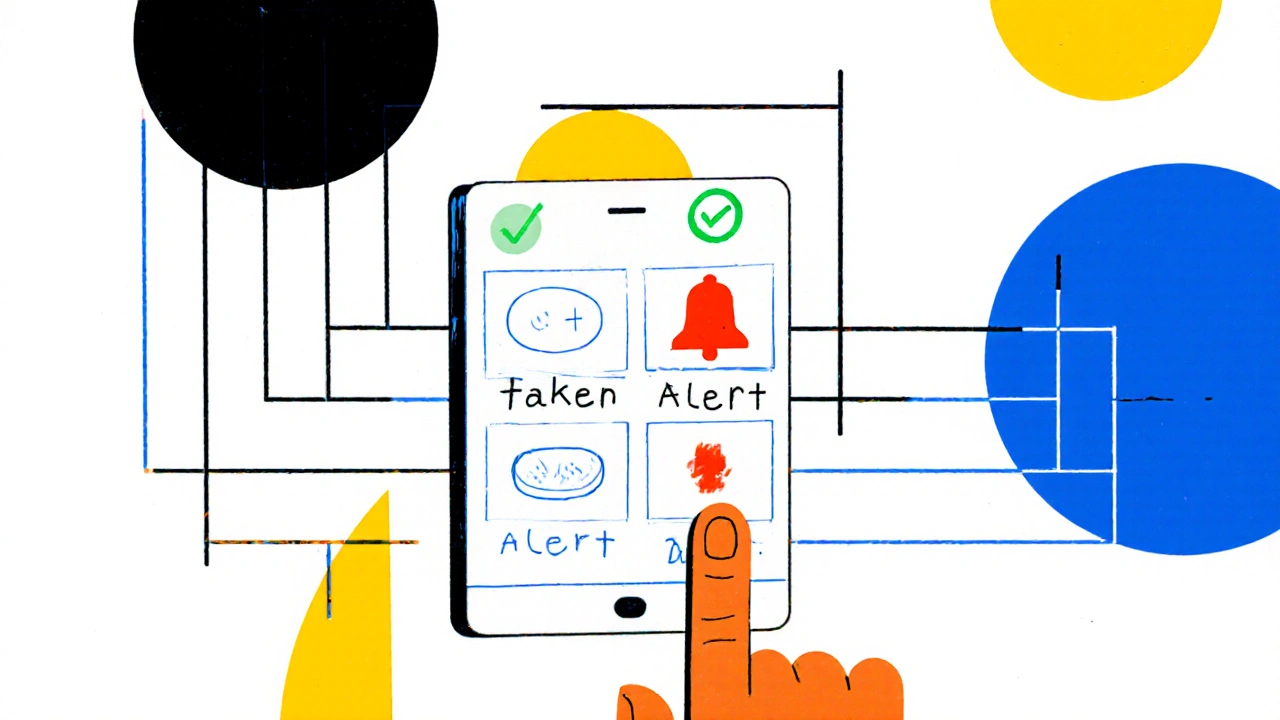
What to Do If You Accidentally Double-Dose
If you realize you’ve taken two doses, don’t wait. Don’t hope it’s fine. Don’t Google it.
Call Poison Control immediately. In Australia, that’s 13 11 26. In the U.S., it’s 1-800-222-1222. They’ll ask you what you took, how much, and when. They’ll tell you exactly what to do next-whether it’s watching for symptoms, going to the ER, or just waiting it out.
Don’t wait for symptoms. Some overdoses don’t show up for hours. Acetaminophen overdose can silently damage your liver. You won’t feel it until it’s too late.
Simple Habits That Make a Big Difference
Here’s what works in real life:
- Take your meds at the same time every day-right after brushing your teeth, with breakfast, or before bed.
- Keep your pill organizer in the same spot. Don’t move it around.
- Don’t refill pills until you’ve used them all. Leftover pills in old bottles cause confusion.
- Check your medicine cabinet every month. Toss expired or unused meds. Don’t store them “just in case.”
- Use one pharmacy. They’ll track everything you’re on and flag duplicates.
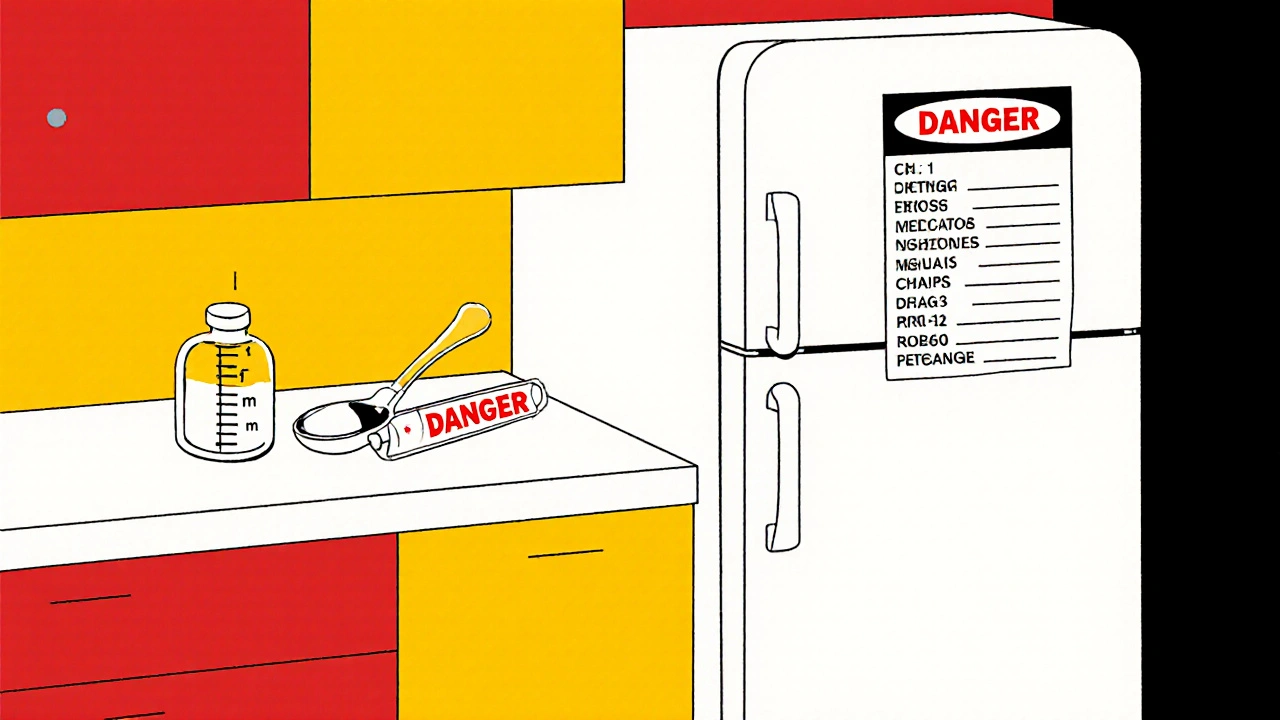
What’s Coming Next
Smart pill dispensers are starting to appear-devices that lock after each dose and send alerts if a dose is missed. Johns Hopkins found they cut double-dosing by 76%. But they’re expensive. For most people, the low-tech solutions still work best.
The future is personalization. AI systems will learn your routine and warn you if you’re about to take a dose too early-or if you’re mixing two meds with the same ingredient. But that’s still a few years away. Right now, the tools you need are already here: a plastic box, a phone, a pen, and a pharmacist who cares.
Final Thought
Medication safety isn’t about being perfect. It’s about being prepared. You don’t need to remember everything. You just need a system that remembers for you.
One pill organizer. One reminder. One list. One person in charge. That’s all it takes to stop a mistake before it happens.
What’s the most common cause of accidental double-dosing?
The most common cause is confusion between multiple caregivers-especially in households with children or elderly relatives. One person gives the dose, another doesn’t know it was given, and gives it again. This accounts for nearly half of all incidents in homes with shared care responsibilities.
Can I use a kitchen spoon to measure liquid medicine?
No. Kitchen spoons vary in size from 2.5mL to 7.3mL, which can result in a 200% overdose. Always use the dosing syringe or cup that came with the medicine. Pharmacies will give you a new one for free if you lose it.
How do I know if two medicines have the same active ingredient?
Check the “Active Ingredients” section on the label. Common duplicates include acetaminophen (Tylenol, cold meds), ibuprofen (Advil, Motrin, some pain relievers), and pseudoephedrine (cold and allergy meds). If you’re unsure, ask your pharmacist-they’re trained to spot these overlaps.
Is it safe to take medicine with alcohol?
It depends on the medicine. Many painkillers, antibiotics, and sleep aids can have dangerous interactions with alcohol-including increased liver damage, drowsiness, or breathing problems. Always check the label or ask your pharmacist. When in doubt, avoid alcohol entirely while taking medication.
What should I do if I think I’ve overdosed?
Call Poison Control immediately: in Australia, dial 13 11 26. Don’t wait for symptoms. Some overdoses, like acetaminophen, don’t cause pain until serious damage has occurred. Have the medicine bottle ready when you call-they’ll need the name and amount.
Can I use a pill organizer for all types of medication?
Most pills can go in a pill organizer. But don’t put medications that need refrigeration (like insulin), liquids, or capsules that dissolve quickly in the open air. Also avoid putting medications that break down in light (like nitroglycerin) in clear plastic organizers. Ask your pharmacist if your meds are safe to store this way.
How often should I update my medication list?
Update it every time your doctor changes a prescription, adds a new medicine, or stops one. Also update it after visiting the pharmacy or buying over-the-counter drugs. Keep the list in your wallet, on your fridge, and share a copy with your main caregiver.


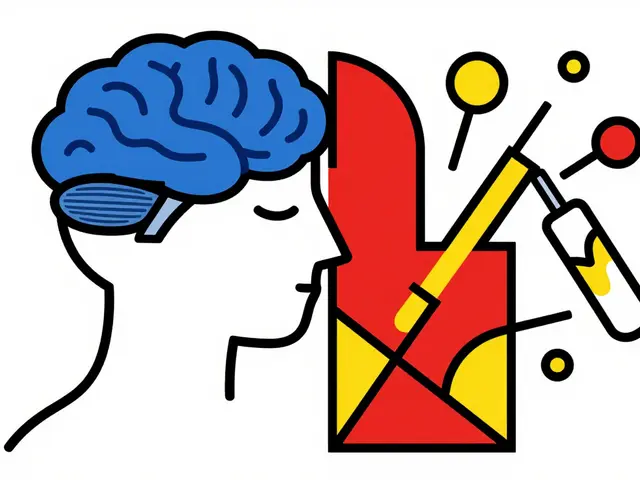
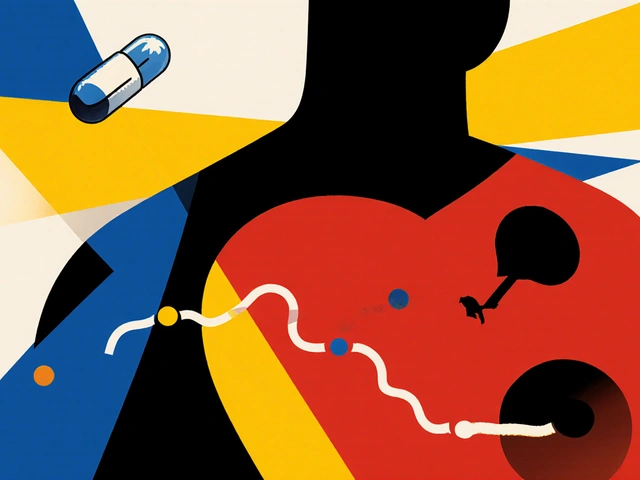
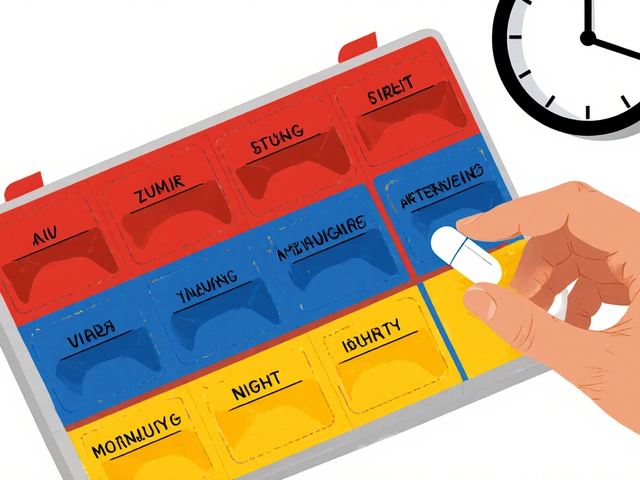
John Kang
November 26, 2025 AT 22:35Been doing it for two years now. Zero mistakes.
Bob Stewart
November 27, 2025 AT 15:23Simran Mishra
November 28, 2025 AT 16:49Holly Lowe
November 28, 2025 AT 17:07Sarah Khan
November 29, 2025 AT 09:13Kelly Library Nook
November 30, 2025 AT 04:48Charity Peters
December 1, 2025 AT 16:58Faye Woesthuis
December 2, 2025 AT 18:09raja gopal
December 4, 2025 AT 06:55Samantha Stonebraker
December 4, 2025 AT 17:15Suryakant Godale
December 4, 2025 AT 21:12ka modesto
December 5, 2025 AT 04:57Cindy Burgess
December 6, 2025 AT 09:08Tressie Mitchell
December 8, 2025 AT 02:04dayana rincon
December 8, 2025 AT 07:35